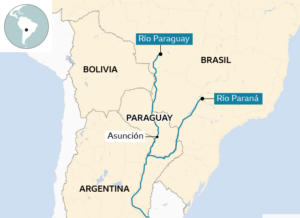Argentina’s Paraná River, the grain superhighway that carries soybeans and corn from the Pampas farm belt to the world, has become so shallow that it has begun to slow international shipments just as the country’s export season gets underway.

The level of the Paraná at the Rosario export hub, where some of the world’s largest soybean crushing plants are located, was just 0.90 meters a week ago, according to the Coast Guard.
Between 1996 and 2020, the average depth of the river at Rosario in April was 3.58 meters. (Zero is a benchmark used by ship captains and not the actual depth of the waterway.)
“We are loading between 5,500 and 7,000 tons less per cargo vessel due to the low water level,” said Guillermo Wade, head of CAPyM’s Chamber of Port and Maritime Activities.
Argentina is the world’s leading exporter of soybeans and the third largest supplier of corn, and maintaining the flow of the Paraná River is key to profitability.
The river flows into the South Atlantic shipping lanes, so a deep Paraná usually allows agricultural products to be loaded in Rosario and unloaded anywhere in the world. This avoids the costly use of barges and extensive trucking that bogs down rival exporters Brazil and the United States.
But recent dry weather in southern Brazil has left the Paraná shallower than normal, and meteorologists say the short-term forecast is for the river at Rosario to be even lower in the coming days.
“The logistical cost to the industry could be between $250 million and $300 million, but that’s a rough estimate. It all depends on how the river level evolves, but the forecasts are not encouraging,” said Alfredo Sese, technical secretary of the Rosario Grain Exchange.
Tonnage cut in Cargoes
The shallow river, which hits just as soybean and corn harvests begin, has set off alarm bells among exporters after a lack of rainfall in 2020 caused the Paraná to reach its lowest point in 50 years.
“The river level is dropping again. Still not as much as last year, but it is on the way down. This is cutting some tons from ships leaving Rosario,” said an executive of a major trading company who asked not to be named.
Argentine farmers are expected to harvest 45 million tons of soybeans this season and 50 million tons of corn, according to the Rosario grain exchange. So far, producers have brought in more than 33% of the 2020/21 soybean crop and about 20% of the corn.
The agricultural sector is Argentina’s main source of export dollars at a time when central bank reserves are hit by a three-year recession exacerbated by the COVID-19 pandemic.
Dredging will be an important factor in ensuring the river’s navigability.
The Parana maintenance contract has been in the hands of Belgian dredger Jan De Nul for the past 25 years. That contract officially expired last week, but the government said last week that the company would continue its work for at least three more months while the government processes bids.
Jan De Nul is one of the international companies expected to compete for the next contract. The government has rejected calls by some local lawmakers for the dredging of the Parana to be handed over to a state-owned company.
“Jan De Nul did a great job last year when we had this problem with the Paraná River. So we have requested that the government extend the current dredging concession for more than 90 days,” said Gustavo Idigoras, head of Argentina’s CIARA-CEC chamber of exporting companies.
“If we don’t have their equipment and expertise, it will be very difficult for another company to guarantee transit on the river,” Idigoras said.
The company declined to comment.
The river at Rosario is currently dredged to about 34 ft (10 m) and industry leaders want the next dredging contract to provide a deeper and wider navigation channel to improve navigability.
Each additional foot of depth allows Panamax vessels, designed to travel through the Panama Canal, to carry between 1,800 and 2,200 tons of additional cargo.
